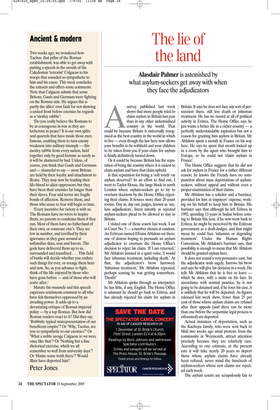Ancient & modern
Two weeks ago, we wondered how Tacitus, that pillar of the Roman establishment, was able to get away with putting a speech in the mouth of the Caledonian ‘terrorist’ Calgacus to his troops that sounded so sympathetic to him and his cause. This week concludes the extracts and offers some comments. Note that Calgacus admits that some Britons, Gauls and Germans were fighting on the Roman side. He argues this is partly the allies’ own fault for not showing a united front before enemies he regards as a ‘motley rabble’: ‘Do you really believe the Romans to be as courageous in war as they are lecherous in peace? It is our own splits and quarrels that have made those men famous, enabling them to turn enemy weakness into military triumph — this motley rabble from every nation, held together only by good fortune as surely as it will be shattered by bad. Unless, of course, you think that Gauls and Germans and — shameful to say — most Britons are held by their loyalty and attachment to Rome. They may now be lending their life-blood to alien oppressors, but they have been their enemies far longer than their slaves. Fear and terror are fragile bonds of affection. Remove them, and those who cease to fear will begin to hate.
‘Every incentive for victory is with us. The Romans have no wives to inspire them, no parents to condemn them if they run. Most of them have no fatherland of their own, or someone else’s. They are few in number, and terrified by their ignorance as they gaze around at unfamiliar skies, seas and forests. The gods have delivered them up to us, surrounded and transfixed ... This field of battle will decide whether you endure such things for ever, or avenge them here and now. So, as you advance to fight, think of the life enjoyed by those who have gone before — and of those who will come after.’ Mutate the mutanda and this speech expresses sentiments common to all who have felt themselves oppressed by an invading power. It adds up to a devastating critique of Roman imperial policy — by a top Roman. But how did Roman readers react to it? Did they say, ‘Rubbish: typical misrepresentation of our beneficent empire’? Or ‘Why, Tacitus, are you so sympathetic to our enemies?’ Or ‘What a noble savage Calgacus is: we were once like that’? Or ‘Nothing but a fine rhetorical exercise, which we all remember so well from university days’? Or ‘Hmm: some truth there’? Would Blair have deported him?
























































 Previous page
Previous page